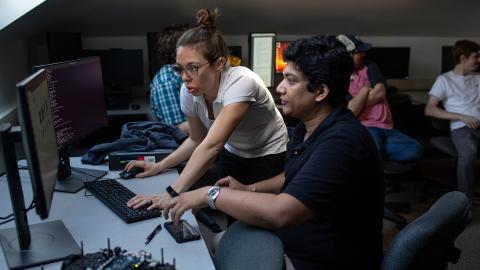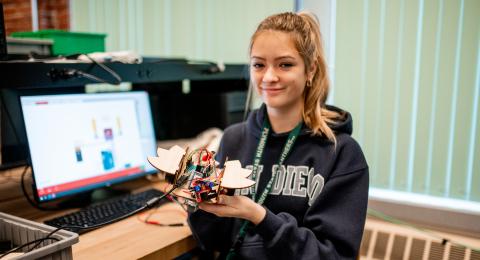You’ve always wanted to be on the cutting edge.
This program is to educate students to build and design real-world automation systems, following a systems approach by integrating electromechanics, existing microcontrollers, and software. It provides students with both theoretical background and practical hands-on experiential learning, preparing them to become innovators, entrepreneurs, and connectors in a dynamic and complex field where teamwork is treasured. The program also connects computer science, electromechanics, and robotics with artistic design and interactive performance.
Students will learn to understand, design, program, build and control a wide range of robots and other autonomous systems. This integrated program provides a holistic introduction to the world of Robotics, beginning with the underlying electromechanical principles, manufacturing fundamentals and introductory programming. Students will continue to master a variety of control units and learn to design and build custom solutions from scratch. During the buffet-style program core, students choose which robotic applications they wish to explore in depth. Finally a real-world capstone project facilitates the transition to gainful employment in industry.
Curriculum & Requirements
| Course | Title | Credits |
|---|---|---|
| Major Requirements | ||
| CS 2010 | Computing Fundamentals (TECO) | 3 |
| CS 2220 | Computer Hardware | 3 |
| CS 2370 | Introduction to Programming | 4 |
| CS 2900 | Digital and Analog Circuits | 4 |
| CS 2901 | Materials, Design and Fabrication | 4 |
| CS 2905 | PLC Programming | 4 |
| CS 3500 | Introduction to Artificial Intelligence | 3 |
| CS 3690 | Applied Robotics | 4 |
| CS 3890 | Engineering Design | 3 |
| CS 3901 | Industrial Robotics | 4 |
| CS 3902 | Adaptive Control Systems | 4 |
| CS 3905 | Mobility, Autonomy, and Teleoperation | 4 |
| CS 4520 | CyberEthics (DICO,WRCO) | 3 |
| CS 4790 | Robotics Capstone | 4 |
| or CS 4920 | Computer Science Internship | |
| MA 2130 | Precalculus (QRCO) | 4 |
| MA 2300 | Statistics I (QRCO) | 3 |
| or MA 3500 | Probability and Statistics for Scientists | |
| MA 2550 | Calculus I (QRCO) | 4 |
| PH 2510 | University Physics I | 4 |
| PH 2520 | University Physics II | 4 |
| General Education | ||
| EN 1400 | Composition | 4 |
| IS 1115 | Tackling a Wicked Problem | 4 |
| CTDI | Creative Thought | 3-4 |
| PPDI | Past and Present Direction | 3-4 |
| SIDI | Scientific Inquiry Direction | 3-4 |
| SSDI | Self and Society Direction | 3-4 |
| Directions (choose from CTDI, PPDI, SIDI, SSDI) | 4-8 | |
| WECO | Wellness Connection | 3-4 |
| GACO Global Awareness Connection | 3-4 | |
| INCP | Integrated Capstone | 4 |
| Electives | 16-6 | |
| Total Credits | 120 | |
- 1
Directions should total 20 credits (unless the major has a waiver for a specific Direction).
Check all course descriptions for prerequisites before planning course schedule. Course sequence is suggested but not required.
To complete the bachelor’s degree in 4 years, you must successfully complete a minimum of 15 credits each semester or have a plan to make up credits over the course of the 4 years. For example, if you take 14 credits one semester, you need to take 16 credits in another semester. Credits completed must count toward your program requirements (major, option, minor, certificate, general education or free electives).
| Year One | Credits | |
|---|---|---|
| EN 1400 | Composition | 4 |
| IS 1115 | Tackling a Wicked Problem | 4 |
| CS 2010 | Computing Fundamentals (TECO) | 3 |
| CS 2370 | Introduction to Programming | 4 |
| CS 2900 | Digital and Analog Circuits | 4 |
| CS 2901 | Materials, Design and Fabrication | 4 |
| MA 2130 | Precalculus (QRCO) | 4 |
| CTDI | Creative Thought Direction | 3-4 |
| Credits | 30-31 | |
| Year Two | ||
| CS 2470 | Systems Programming in C/C++ | 2 |
| CS 2905 | PLC Programming | 4 |
| CS 3240 | Data Communication and Computer Networks | 3 |
| Major Elective | 3-4 | |
| Electives | 3-4 | |
| MA 2300 | Statistics I (QRCO) | 3 |
| MA 2550 | Calculus I (QRCO) | 4 |
| SIDI | Scientific Inquiry Direction | 3-4 |
| PPDI | Past and Present Direction | 3-4 |
| Credits | 28-32 | |
| Year Three | ||
| CS 3420 | Introduction to Cybersecurity | 3 |
| CS 3890 | Engineering Design | 3 |
| CS 4520 | CyberEthics (DICO,WRCO) | 3 |
| Major Electives | 6-8 | |
| Electives | 6-9 | |
| World Language Requirement | ||
| GACO | Global Awareness Connection | 3-4 |
| SSDI | Self and Society Direction | 3-4 |
| Credits | 27-34 | |
| Year Four | ||
| CS 4790 | Robotics Capstone | 4 |
| Major Electives | 6-8 | |
| Electives | 6-8 | |
| Directions (choose from CTDI, PPDI, SIDI, SSDI) | 3-4 | |
| DICO | Diversity Connection | 3-4 |
| WECO | Wellness Connection | 3-4 |
| INCP | Integrated Capstone | 4 |
| Credits | 29-36 | |
| Total Credits | 120 | |
- 1
Directions should total 20 credits (unless the major has a waiver for a specific Direction).
- Systematically interpret, analyze, and evaluate real-world problems with stakeholders.
- Translate real world problems into the technical scope, create problem definitions and systems proposals that specify the system to be implemented.
- The ability to select the appropriate tools, methods, machines, languages, and general approaches to a given problem solution.
- Design, build, and assemble robots and other hardware in a safe fashion.
- Develop software to control such hardware using common software design principles in a variety of languages.
- Properly test machinery using standard protocols to assure functionality, usability, and safety.
- Computer Programmer
- Computer Systems Manager
- Control Engineer
- Database Administrator
- Manager, Management Information Systems
- Network Administrator
- Quality Assurance Specialist
- Robot Software Engineer
- Robot System Engineer
- Software Designer
- Software Developer
- Software Engineer
- System Analyst
- Web Application Developer
- Technical Writer
- Web Designer
- Ability to analyze cause and effects
- Ability to think logically and critically
- Strong communication skills
- Mathematical background
Explore Program Details

As a Computer Science and Technology student you will be part of a tight-knit community. We spend a lot of time working in teams on projects, playing games over lunch with professors, and asking questions during open tutoring hours. These connections not only keep the department lively, but also build a network that can provide career opportunities.
- Evening tutoring hours
- Internship and career opportunities
- Boardgame groups
- Meet and talk with alumni in the field
- Senior Project presentations
More to Explore
Explore Today.
Realize Tomorrow.







